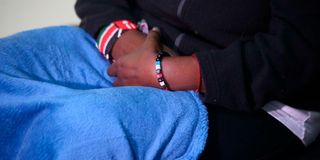The three phases of hell: How rape trauma unfolds long after the attack

A sexual assault survivor. A woman who was gang-raped in front of her children during post-election violence, lost her job, her husband, and nearly her life.
What you need to know:
- Online mockery greeted news of 14 rape cases during Gen-Z protests.
- Neema was gang-raped in 2013 and spent six years housebound, abandoned by her husband, and battling suicidal thoughts.
- Counselling costs Sh2,000 to Sh6,000 per session—too expensive for most survivors who desperately need help.
When Nation reported that women’s rights organisations had documented 14 cases of rape and gang rape during the June 15 Gen-Z anniversary protests, the revelations sparked online mockery, disbelief and vile jokes.
But for the women affected, this is no laughing matter. It is a brutal upheaval of their lives, leaving behind scars that run deep and can never be erased.
It is the kind of trauma that Neema has carried for more than a decade.
In 2013, at the height of the post-election chaos, three men gang-raped her in front of her husband and four children in Manyatta, a low-income settlement in Kisumu County.
What followed was a silent, isolating nightmare. For nearly six years, Neema rarely left the house, crippled by the trauma, the stigma of being branded “the raped woman,” and the abandonment by her husband, who blamed her for what had happened.
She left her job at a construction company, where she had just been promoted to supervisor, because she could no longer focus. Her productivity collapsed, and so did her will to live.
It was only the kindness and courage of another woman, also a survivor of rape during the 2007/08 post-election violence, who pulled her back from the edge.
“She counselled me and helped me come back to life. I was alive but dead,” Neema recalls.
“I didn’t speak to my children. I was so bitter. I tried to hang myself several times, but my children would suddenly walk in and stop me.”
Disgusting
“Had I not been counselled, I think I’d be dead by now. Rape killed me from the inside and people didn't see it. I hated myself. I felt dirty, like the smell of those men never left me. It was so disgusting. To date, I still feel like I’m not a normal, whole woman.”
Rape survivors are often left battling more than physical injuries. The aftermath includes severe psychological, emotional, and social trauma that, if left untreated, can erode every facet of a person’s life.
According to Peris Miano, a counselling psychologist and founder of Pillar for Mental Health Support in Kerugoya, Kirinyaga County, many rape survivors experience rape trauma syndrome, a form of post-traumatic stress that unfolds in three distinct phases, each marked by its own set of debilitating challenges.
“The first is the acute phase, where survivors show immediate reactions such as shock, fear, or complete disorientation,” she explains.
“Some appear composed, but inside, they’re overwhelmed and disconnected.”
The second phase, known as the outward adjustment phase, is often deceptive. Survivors may return to daily routines and seem fine to outsiders.
“But they’re suppressing the trauma. Emotionally, they’re far from okay,” says Peris. This phase is marked by anxiety, avoidance, and a struggle to feel normal.
Also read: 14 women raped during June 25 protests
The final stage is the resolution phase, where healing can begin. Survivors start processing the trauma, rebuilding their self-worth, and reconnecting with their lives.
“But not everyone reaches this phase without support,” she adds.
The consequences of rape trauma are far-reaching. Psychologically, survivors may suffer flashbacks, nightmares, panic attacks, persistent sadness, suicidal thoughts, and a crushing sense of self-blame, she says.
Physically, the toll may include injuries, sleep disturbances, chronic headaches, eating disorders, and risks of sexually transmitted infections or unwanted pregnancies, she notes.
Behaviourally, many turn to substance abuse, withdraw socially, or engage in self-harm, she explains.
“Trauma can make survivors mistrust even the people closest to them,” says the counselling psychologist. “It destroys relationships, impacts work and school performance, and in some cases, pushes people to the brink.”
While trauma counselling is critical, it remains out of reach for many.
“Counselling sessions range from Sh2,000 to Sh6,000, a cost most survivors cannot afford,” she says.
“Rape isn’t just a moment of violation,” says Peris.
“It’s a lifetime of pain if we don’t respond with the care, urgency, and compassion survivors deserve.”


